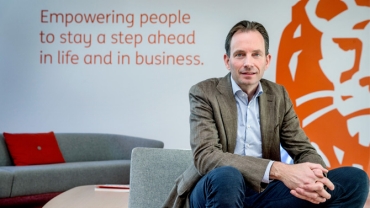
Finance professionals are themselves responsible for lifelong learning
15/06/21
Upskilling finance professionals
‘The profession and profile of finance professionals will change in the years ahead’, say PwC experts Sophie de Vries and Vanessa van de Wiel. ‘The thorough implementation of upskilling is therefore a necessity, but this requires an investment in time and energy. That's not always easy during a period when finance professionals are under great pressure. There is, however, an expected return on investment (ROI) in terms of productivity, employability and innovation. It is vital that finance professionals take their own responsibility for employability and lifelong learning.’

Sophie de Vries, finance expert bij PwC
Employability of finance professionals
Eighty per cent of CEOs in the Netherlands are concerned whether their employees possess essential skills. But only eightteen per cent have actually engaged in ongoing upskilling in the past year. Many CEOs are concerned, but hardly anyone really knows where to start and what to do effectively', says Vanessa van de Wiel, people & organisation specialist at PwC.
Within the finance organisation, too, ‘employability’ is a recurring theme. Ensuring that employees remain employable, now and in the future, whether or not they remain with your organisation. Learning new skills that are essential for performing work is an important factor. But a culture change is also needed in this respect. In the past, much was invested in formal – often traditional – types of learning. Nowadays, you see that the ROI from smaller and more digital forms of learning is very high. Learning is not necessarily bound to a classroom setting; digital 'learning bites' are also very beneficial. This means that finance professionals can take responsibility for their own learning process.'
'Many finance professionals have been doing their jobs for years. Guide them, inspire them, show them what a future finance position might look like and how new technologies can help.'
Transformation of finance positions
Sophie de Vries, finance expert at PwC, agrees that finance professionals must take their own responsibility. But, 'in the transformation of finance positions, there is nevertheless an important role for the management of companies. Management must offer opportunities to finance professionals while emphasising that it is their own responsibility to take initiatives and encouraging them to do so. Many finance professionals have been doing their jobs for years. Guide them, inspire them, show them what a future finance position might look like and how new technologies can help. These are essential focus areas in the transformation and upskilling of finance professionals.’
Prioritising upskilling
Upskilling is not yet a top priority in all cases. This is partly due to the lack of awareness among finance professionals that upskilling really is their own responsibility. This is partly the result of all of us being very much taken up by everyday affairs. ‘The main tasks of finance – reporting, accounting, transaction processing – will remain’, says De Vries. ‘And as long as those still take up a lot of time, there is little room for other matters. The need for upskilling is then limited in the short term. However, you do see that problems are becoming more pressing: monthly closings are taking up a lot of time and the introduction of changes has a long lead time. Some finance professionals would like to develop, but so far there is no urgency to change this immediately.’

'Many CEOs are concerned, but hardly anyone really knows where to start and what to do effectively.'
COVID-19 as accelerator
‘From the perspective of finance professionals, the most important challenge is to identify what future skills they need’, De Vries explains. ‘When should you start upskilling and when can you apply what new skills in your work environment? Because very practically speaking, if you teach finance professionals to master a tool now that they won't use or have at their disposal for the next five years, it won't be of much use.’
‘The fact that you not only have to upskill, but also have to do it all digitally during the COVID-19 pandemic is another challenge’, Van de Wiel adds. ‘Although the development of training courses into learning journeys has been going on for some time, the coronavirus crisis is speeding up this process. A learning journey is a collection of training interventions that support a personal learning path to a future financial role. The digitisation of training courses has taken place very quickly and the use of tools has also improved. Needless to say, there is also the lack of the social side of training – learning together – but the new digital approach also allows for a lot of creativity that you didn't have before, or less so. As everything is online, it is easier to access certain speakers and facilitators, more virtual speed dates are possible and you no longer have to be in the same place to create joint content. The digital approach also brings international groups together more easily. What organisations save in travel and accommodation costs, they can invest in expanding their learning and development budgets.’
Future skills
Finance professionals must continue to learn and develop, Sophie de Vries and Vanessa van de Wiel state resolutely. ‘In the near future, many transactional activities within the finance sector will be increasingly automated. In future finance positions, the focus will be on the finance business partner role, in which finance contributes proactively to business performance through true value creation’, predicts De Vries. ‘For this purpose, finance professionals need to have several new skills, such as:
Analytical acumen
First of all, analytical acumen. Finance positions are involving more and more data. This results in increasing insights through the application of various data analyses. Therefore, more and more data analysts are working in finance positions, or finance positions use data analysts within the organisation. Nevertheless, the finance professional is also expected to be able to perform more and more data-driven analyses. For most roles in the future finance positions, analytical acumen is a requirement.
Digital acumen and collaboration
Another important aspect is digital acumen: digital knowledge of how finance professionals can apply the various digital tools available to them in their work. New technologies are creating many new opportunities within finance positions. Many finance positions are already using RPA, AI, NLG, etc. The first application is often for a specific process. This will be further expanded in the years ahead. The business will have to respond increasingly quicker to developments in the market and if finance really fulfils its role as finance business partner, then finance will have to match the pace of the business. The importance of the collaboration skill is increasing.
Communication and storytelling
Existing skills, such as communication and storytelling, also need to be further developed. Finance professionals must learn to present the story properly to their business partners. Increasingly, this is performed with the help of dashboards, but you often see finance professionals wanting to explain all the figures down to the decimal point. In the discussion with the business, the story and the different scenarios behind those figures are the important factors. Finance professionals need to communicate that story better.
Business acumen
Business acumen is already an important skill. Really understanding what is happening within the business and what developments are taking place in the sector is becoming increasingly important. This allows you, as a finance professional, to contribute constructively to the business.’
Change management acumen
‘Another example is change management acumen’, adds Van de Wiel. ‘Team managers and finance leaders will not only have to help their teams through the transformation and provide their stakeholders with the right information to deliver reports and services to the business, but also change themselves to remain employable through upskilling. Getting that change off the ground is not very easy. It's a matter of tinkering with the aircraft while it is flying. At the same time, making room for process improvement (and ultimately transformation) also creates a lot of positive energy and a boost to productivity.’
Roadmap for successful transformation
‘For a successful transformation, creating a roadmap for the development of your future finance workforce is important’, De Vries advises. ‘If you take the finance vision as a starting point, you can determine what that future workforce should look like. You match this with your current workforce and then decide how to bridge any gap between the two. A good roadmap for upskilling then helps. Perhaps you could start with inspiration sessions and later more training on the job based on new processes or systems or external training or education or you hire new people.
It is important to distinguish between different personas in the roadmap. You can describe upskilling per role and translate it to individuals, as some finance professionals are more advanced than others in several ways. You can incorporate this in a personal development plan and see which training courses are relevant for progressing to a particular role. You can then test the results by means of individual assessments and take the desired steps.’
ROI of upskilling
Such a structured approach not only benefits employees, but also makes the ROI of upskilling transparent for the company. ‘The ROI of upskilling is not always clear’, according to Van de Wiel. ‘That is mainly due to the applicability. You may be able to upskill, but if you cannot properly apply the skills in practice, the ROI is limited. Employers need to be aware of this: if you put effort into an upskilling programme for finance positions, you must assess the fertility of the ground in which that programme is embedded. If that added value does not exist, you have to ask yourself whether such an investment is realistic.’
‘Examine your target group very specifically and determine what step you wish to take and what training is needed for that purpose’, De Vries concludes. ‘In general, we see that the people component is becoming increasingly central in the transformation of finance positions. At first, the transformation was more about systems and adapting them. That still plays a role, but nowadays the following applies more: let's include people right from the start and help and encourage them to experience the transformation for themselves.’
‘In the near future, many transactional activities within the finance sector will be increasingly automated. In future finance positions, the focus will be on the finance business partner role, in which finance contributes proactively to business performance through true value creation.’
Contact us




















